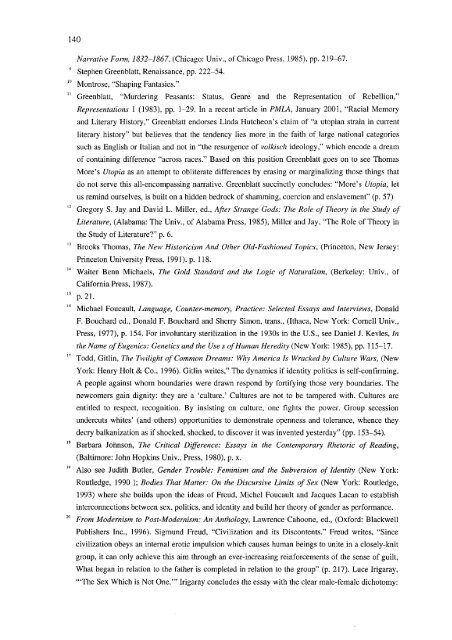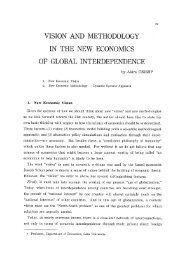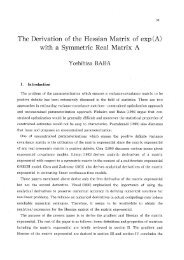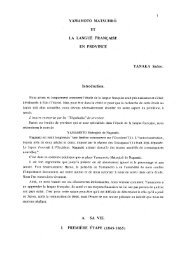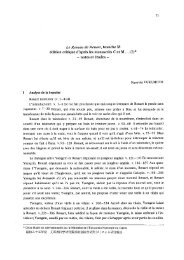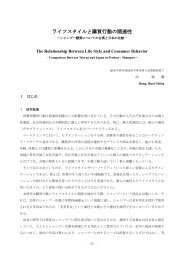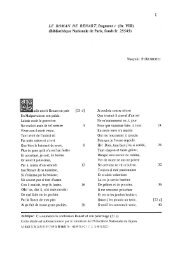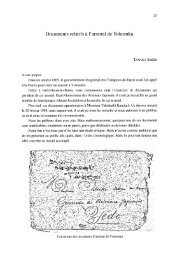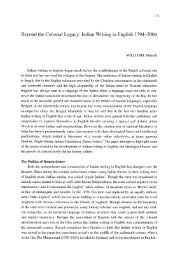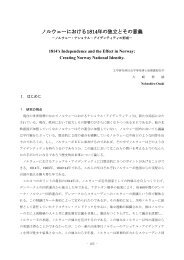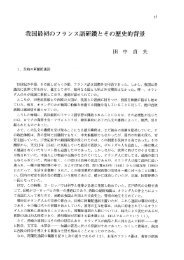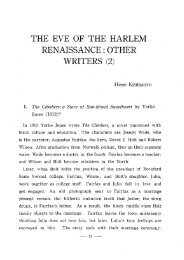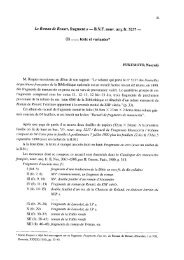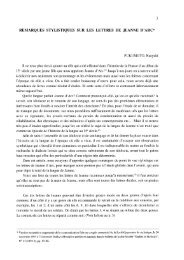New Historicism and Literary Studies - Soka University Repository
New Historicism and Literary Studies - Soka University Repository
New Historicism and Literary Studies - Soka University Repository
You also want an ePaper? Increase the reach of your titles
YUMPU automatically turns print PDFs into web optimized ePapers that Google loves.
140<br />
Narrative Form, 1832-1867, (Chicago: Univ., of Chicago Press, 1985), pp. 219-67.<br />
9 Stephen Greenblatt , Renaissance, pp. 222-54.<br />
1° Montrose , "Shaping Fantasies."<br />
11 Greenblatt , "Murdering Peasants: Status, Genre <strong>and</strong> the Representation of Rebellion,"<br />
Representations 1 (1983), pp. 1-29. In a recent article in PMLA, January 2001, "Racial Memory<br />
<strong>and</strong> <strong>Literary</strong> History," Greenblatt endorses Linda Hutcheon's claim of "a utopian strain in current<br />
literary history" but believes that the tendency lies more in the faith of large national categories<br />
such as English or Italian <strong>and</strong> not in "the resurgence of volkisch ideology," which encode a dream<br />
of containing difference "across races." Based on this position Greenblatt goes on to see Thomas<br />
More's Utopia as an attempt to obliterate differences by erasing or marginalizing those things that<br />
do not serve this all-encompassing narrative. Greenblatt succinctly concludes: "More's Utopia, let<br />
us remind ourselves, is built on a hidden bedrock of shamming, coercion <strong>and</strong> enslavement" (p. 57)<br />
12 Gregory S . Jay <strong>and</strong> David L. Miller, ed., After Strange Gods: The Role of Theory in the Study of<br />
Literature, (Alabama: The Univ., of Alabama Press, 1985), Miller <strong>and</strong> Jay, "The Role of Theory in<br />
the Study of Literature?" p. 6.<br />
13 B rooks Thomas, The <strong>New</strong> <strong>Historicism</strong> And Other Old-Fashioned Topics, (Princeton, <strong>New</strong> Jersey:<br />
Princeton <strong>University</strong> Press, 1991). p. 118.<br />
14 Walter Benn Michaels , The Gold St<strong>and</strong>ard <strong>and</strong> the Logic of Naturalism, (Berkeley: Univ., of<br />
15<br />
California Press, 1987).<br />
p. 21.<br />
15 Michael Foucault , Language, Counter-memory, Practice: Selected Essays <strong>and</strong> Interviews, Donald<br />
F. Bouchard ed., Donald F. Bouchard <strong>and</strong> Sherry Simon, trans., (Ithaca, <strong>New</strong> York: Cornell Univ.,<br />
Press, 1977), p. 154. For involuntary sterilization in the 1930s in the U.S., see Daniel J. Kevles, In<br />
the Name of Eugenics: Genetics <strong>and</strong> the Use s of Human Heredity (<strong>New</strong> York: 1985), pp. 115-17.<br />
17 Todd , Gitlin, The Twilight of Common Dreams: Why America Is Wracked by Culture Wars, (<strong>New</strong><br />
York: Henry Holt & Co., 1996). Gitlin writes," The dynamics if identity politics is self-confirming.<br />
A people against whom boundaries were drawn respond by fortifying those very boundaries. The<br />
newcomers gain dignity: they are a `culture.' Cultures are not to be tampered with. Cultures are<br />
entitled to respect, recognition. By insisting on culture, one fights the power. Group secession<br />
undercuts whites' (<strong>and</strong> others) opportunities to demonstrate openness <strong>and</strong> tolerance, whence they<br />
decry balkanization as if shocked, shocked, to discover it was invented yesterday" (pp. 153-54).<br />
18 Barbara Johnson , The Critical Difference: Essays in the Contemporary Rhetoric of Reading,<br />
(Baltimore: John Hopkins Univ., Press, 1980), p. x.<br />
19 Also see Judith Butler , Gender Trouble: Feminism <strong>and</strong> the Subversion of Identity (<strong>New</strong> York:<br />
Routledge, 1990 ); Bodies That Matter: On the Discursive Limits of Sex (<strong>New</strong> York: Routledge,<br />
1993) where she builds upon the ideas of Freud, Michel Foucault <strong>and</strong> Jacques Lacan to establish<br />
interconnections between sex, politics, <strong>and</strong> identity <strong>and</strong> build her theory of gender as performance.<br />
2° F rom Modernism to Post-Modernism: An Anthology, Lawrence Cahoone, ed., (Oxford: Blackwell<br />
Publishers Inc., 1996). Sigmund Freud, "Civilization <strong>and</strong> its Discontents." Freud writes, "Since<br />
civilization obeys an internal erotic impulsion which causes human beings to unite in a closely-knit<br />
group, it can only achieve this aim through an ever-increasing reinforcements of the sense of guilt,<br />
What began in relation to the father is completed in relation to the group" (p. 217). Luce Irigaray,<br />
"`The Sex Which is Not One .— Irigaray concludes the essay with the clear male-female dichotomy:


